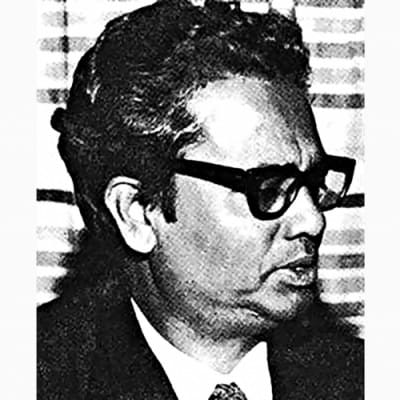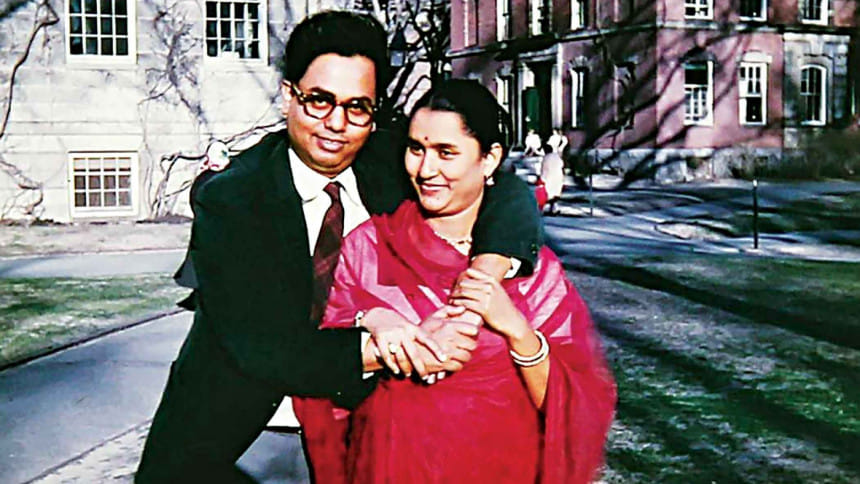Kobor: A unique artistic representation of an unusual situation

He made it clear at the very beginning that he was passing extremely hectic times and that it would not be possible for him to talk for long. He told me that he undertook some important project recently, which was keeping him awake till late at night—till 3 or 4 am in the morning. I saw scribbled papers spread all across the room. Yet, when I told him that I came to learn about the background of his much-acclaimed play Kobor (The Grave), his face brightened up.
He remained silent for a moment. Then, slowly, he got immersed in memories. He wanted to go away from this neon-lit house in Nilkhet and get lost in the days that were long gone. During the cold nights of December and January in 1953, Munier Chowdhury was in Dhaka Central Jail. He was feeling restless and focused his thoughts on writing Kobor in a small notebook, the play which stirred the whole nation during that time and is still discussed with similar enthusiasm. The play carries the signature of originality in all aspects—from the selection of the content to the novelty of its form and the construction of its scenes.
Munier Chowdhury was in jail during that time. He was arrested with several others during the Language Movement in 1952. He used to live with 15 to 20 political prisoners in one room. In another room, there were 60 to 70 political prisoners. Among them was Ranesh Dasgupta.
"It was Raneshda who secretly wrote me a letter. He wrote that Ekushey February was around the corner and asked me to write a play to be staged inside the jail. I had to write it as it was Raneshda's order."
"Who were with you in jail during that time?"
"There were many people: Abul Hashim, Muzaffar Ahmed, Oli Ahad, Mohammad Toaha, Ajit Guha, Maulana Abdur Rashid Tarkabagish, Khoyrat Hossain and Sheikh Mujibur Rahman."
Munier Chowdhury told me that he became close to Sheikh Mujibur Rahman in jail.
"Wasn't it difficult to stage the play in prison?"
"Of course, it was difficult. And that's why the form of the play had to be innovative. To tell you the truth, Kobor was an artistic representation of a special situation."
"Would you please explain?"
"For instance, the lamps (hariken) used in the play helped portray the solitude of the burying ground. Raneshda told me that they would stage the play in their room after 10 o'clock at night when all the lights of the prison would be turned off. The plan was to borrow 8/10 lamps from the student prisoners (who used to study at night with those) to make the stage. Actually, we were forced to create a mysterious atmosphere of light and darkness in the play. Otherwise, it wouldn't have been so successful that day in the dim light of a prison cell. And that's why after coming back from prison, I never talk about the lack of a stage."
"Have you ever seen a play being staged in a small place abroad?"
"Of course. You will be surprised to know that most of the experimental plays abroad are shown in small rooms, in a very confined and homely environment. The audience gets the scope to watch the play from such a close distance that during the performance, there remains no gap between the audience and the performers."
"Do you remember any such plays?"
"When I went to West Germany about a year ago, I had the scope to watch such plays at people's homes. I was fascinated by the two plays named The Rehearsal and The Mail Train Stops Here. What I think is, the really good plays that are close to life are not being staged in big theatres but in small houses and in the presence of passionate youth in that country."

"I couldn't watch the play in jail though, because I was in another room. I heard that the performance was also great. I personally think that it's the best thing I've ever written. But it was also controversial."
"How did you feel when Kobor was first being performed in a room in prison and you knew it from a distance?
"I felt aloof. Because prison is such a place where one has to overcome all kinds of mental anxieties and I have never had any anxiety about my own writing."
"What is your own opinion about Kobor?"
"This is, undoubtedly, my best writing that has opened my eyes."
"Where was the play first published?"
"A copy of the play got out of the jail right after I wrote it. It was first published in Dainik Shangbad. Then in a compilation of writings on Ekushey, edited by Hasan Hafizur Rahman. Later, I felt that this play might have been influenced by another foreign language play. But I felt that much later."
He got lost in memory again. He kept his eyes closed for a while as his greying hair covered his forehead. One side of his forehead rested on his palm.
"It was '43, '44. I got to talk to some leftist, progressive American soldiers. They lived in Kurmitola at the time. I got the opportunity to read quite a few books from them. My interest grew in American literature, especially drama, and through extensive reading, I became quite familiar with it. Those soldiers' progressive thoughts attracted me. Some of them became very intimate friends. One of them is the famous Dr Norman Springer."
"You said the play, Kobor, has some influence from a certain foreign play."
"Oh yes. Bury the Dead. I just read it at that time. There was a dead person's protest—he didn't want to be buried, he screamed. If there is a thematic similarity, it's there. But none of this came to my mind when I wrote Kobor. I somewhat strangely discovered this connection a few years later. I think it was an influence of the subconscious."
"Did Kobor face any criticism?"
"There was enough. Many asked why I brought humour in such a spooky and mysterious environment. To those, I say, I have always found some form of morbid satisfaction amidst horror. When there was a tragedy, I prominently saw, or you could say I tried to see, its grotesque elements. This has always been my feeling. For instance, the leader's physical gestures in Kobor are really comical, which was also the reason why it was like this."
"Is that all? Is there any other belief/conviction that directed you?"
"Look, I got to know the Muslim leadership up close. In light of that intimacy, their characteristic pointlessness/banality became prominently visible to me. The comic nature of their activities became glaringly obvious to me. These must have influenced my writings. Those who come from the lower middle-class background, have resentment as unadulterated as their intense anger. Since I saw them from a different angle, what caught my attention was their characteristic emptiness."
Munier Chowdhury said he has yet to see a good production of Kobor. The sloppy production in the country's theatre pained him.
"This is why I don't feel like seeing my own plays, you know. I barely ever go. University students staged my drama only a few days ago. I noticed that none of them memorised the dialogues well. It really makes me annoyed."
I had never seen Munier Chowdhury getting agitated. This time was no exception. He spoke indifferently, in a manner that he always did. However, he had a minor complaint.
"It will be a mistake to try to find only the significance of Ekushey in Kobor. Maybe I have tried to say more. Something more," Munier Chowdhury said, taking a little pause.
"Many comments have been made about your play Kobor. Which one among them has touched your mind?"
"That's right. I have heard a lot of comments and also read many criticisms. Raneshda made a remark on the notebook in which I wrote the play first. When he sent the notebook back to me, I saw a comment by him that still shines in my mind. What Raneshda tried to tell me was that if I had a clear political conviction, if I had not been in any doubt or hesitation, the play might have ended differently."
"Were you moved by Ranesh Dasgupta's comment?"
"A lot. Raneshda asked me in that comment if a writer should always remain in uncertainty. Isn't there the truth in front of us? Many now say if I were fully involved with politics, I would have been better-off and my country would also have benefitted."
"What are your thoughts on people's theatre (gononatok)?"
"As long as society is divided into different classes, the appeal of a particular writing will be different to different people. All sections of people in a society cannot enjoy the same artistic pleasure at the same time."
"The plays you have written are intellectual and the dialogues you have written are tactful. Will ordinary people understand it?"
I am a city dweller. I can't write for anyone except the highly educated people, because I have no clear idea about the sacrifices being made by the working class people. Their pain should be expressed, the price of their sweat has to be given in our writings. We have to understand the greatness of life, the greatness of being alive. But these cannot be and should not be written in the shelter of insincerity."
Translated from Bangla by Naznin Tithi.

 For all latest news, follow The Daily Star's Google News channel.
For all latest news, follow The Daily Star's Google News channel. 



Comments